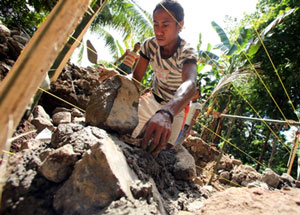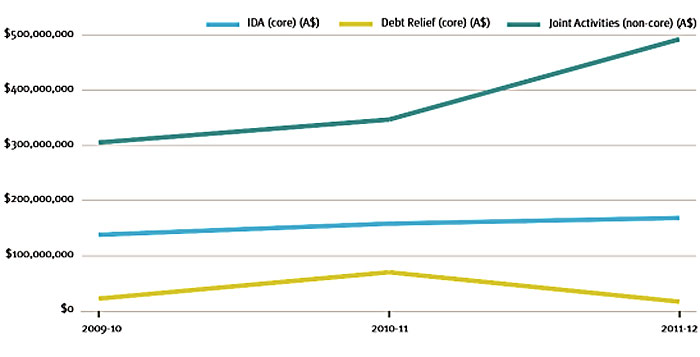The Australia World Bank partnership is helping to build community infrastructure, generating millions of work days for local communities. Photo: Josh Estey, AusAID
Together, Australia and the World Bank Group are working to reduce poverty and boost development. Under the Australia – World Bank Group Partnership Framework, Australia and the World Bank Group will focus on 10 priorities for future engagement. These are:
To strengthen development coordination and improve development results in
- the Pacific
- South-East Asia, particularly in Indonesia and the Mekong
- South Asia, particularly in fragile and post-conflict countries such as Afghanistan, Pakistan and Sri Lanka
- Sub-Saharan Africa
- increase cooperation to promote the private sector as a means of addressing development priorities
- strengthen and expand cooperation in sustainable development including sectoral cooperation in water, energy, transportation, disaster management, urban development, natural resources and agriculture
- explore further opportunities for collaboration and the exchange of experience and expertise of working in small and fragile state environments, including a specific focus on initiatives to promote private sector development
- enhance cooperation on global action on climate change and other environmental issues, including collaborative initiatives in the Asia and Pacific regions
- explore further opportunities for collaboration and sharing experience and expertise in relation to education, and working on joint programs
- ensure strengthened focus within both organisations on addressing issues relating to gender and people with disabilities in policy development and program implementation.
and to:
Australia's annual contributions to the World Bank ensure Australia is truly global in its reach and plays a role in helping countries throughout the world. They also allow Australia to have a strong say in how the World Bank Group's resources are used.
Australia contributes to the World Bank's fund for the poorest countries, the International Development Association ($168 million in 2011–12) as well as to World Bank debt-relief funds ($17 million in 2011–12). Australia is also the 17th largest shareholder in the International Bank of Reconstruction and Development, with a shareholding of 1.55 percent of total capital.
Australia and the World Bank Group have a growing portfolio of joint activities across the globe. In 2011–12, Australia provided $492 million in non-core funding to more than 75 joint activities with the World Bank Group, up from $347 million in 2010–11. The multi-year portfolio of ongoing activities is estimated at $2.2 billion.
Above: Australian funding to the World Bank Group, 2009–10 to 2011–12
Unlocking potential, achieving results
Headline results reported in 2012:
- Access to finance provided to more than 500,000 people in the Pacific.
- More than 12,300 vulnerable people in Honiara, Solomon Islands benefited from training and work experience.
- Improved access to running water and sanitation benefited more than 5 million Indonesians. More than a million households in the Philippines benefited from community-led projects such as new school buildings, improved water facilities and critical infrastructure.
- More than 20,000 vulnerable Indonesian women benefited from empowerment activities like literacy and numeracy training.
- More than one thousand Lao school principals trained in leadership and a 'Schools of Quality approach' and one hundred Lao pre-primary teachers received pre-primary training.
- $12 million provided in emergency cash transfers, benefiting more than 44,000 people in conflict-affected communities in Sri Lanka.
- School enrolments in Afghanistan increased from around one million to more than eight million, including more than three million girls.
- Antenatal care provided to more than 130,000 Afghani women ensuring 34 per cent of births attended by skilled attendants.
- Approximately 64,000 people in Mozambique provided with a treated water supply.


